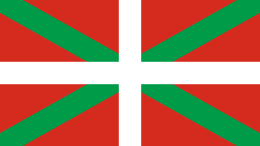Athletic Bilbao signing policy

Since 1912, Spanish association football club Athletic Bilbao have had an unwritten rule whereby the club will only sign players who were born or raised in the Basque Country, or who learned their football skills at a Basque club.[1][2] The policy is related to Basque nationalism[3] and has been praised as a way to promote local talent,[4] although it has also been criticised as being discriminatory.[5]
History
Despite being founded by Englishmen,[6] since 1912 Athletic Bilbao have adhered to a cantera policy of allowing only players born in the Basque Country or with Basque ancestry to play for them.[7] The motto used to describe the reasoning behind it is "Con cantera y afición, no hace falta importación" (English: "with home-grown talent and local support, you don't need foreigners").[8] They were not the only club to adhere to such a policy; fellow Basque club Real Sociedad had a similar policy but this was dropped in 1989 when they signed the Republic of Ireland forward John Aldridge.[9] The policy is not written into the club's rulebook but was a philosophy of the club in order to promote local players.[5][8] It was initially intended that the policy meant that only players born in the Basque Country could play for Athletic Bilbao, but this later extended to at least one Basque parent, and further into great-grandparents being sufficient to fulfill the policy.[10] The policy also extends to Athletic's feeder clubs of CD Basconia and Athletic Bilbao B and to their youth teams.[11]
The policy has been praised as a symbol of localised football being successful at the highest level, as well as preserving a strong regional identity[12] and being a way for Basque nationalism to be moderately expressed.[3][12][13] It has been described as discriminatory for only allowing Basque players to play for Athletic Bilbao,[7] although it has been suggested that the policy is working for them since Athletic Bilbao are one of only three clubs (along with Real Madrid and Barcelona) never to have been relegated from La Liga.[8]
Black and French players
The policy also had the inadvertent consequence of Athletic Bilbao being the last club in La Liga to have never fielded a black player. That was ended in 2011 when Jonas Ramalho made his debut.[14] In 2015 Iñaki Williams (born in Bilbao to African immigrant parents) became Athletic's first black goalscorer.[15] The club also rarely fielded players from the French Northern Basque Country, with Bixente Lizarazu being the first French Basque to play for the club in 1996 and Aymeric Laporte the first to successfully graduate from the youth system in 2012.[16]
Players from Biscay
It was once the case that Athletic would usually recruit from the Biscay region surrounding Bilbao while the other leading clubs Real Sociedad and Osasuna would focus on players from their respective regions Gipuzkoa and Navarre. In recent decades Athletic have expanded their recruitment in these other regions in their efforts to accommodate the best players with any Basque links, and while this has seen many talented players from San Sebastián and Pamplona join the club (and caused Real Sociedad to abandon their own Basque policy in the face of this competition for signings), it has led to fewer players from Biscay being selected; in a 2011 match none of the starters or substitutes were from that area.[17] However in subsequent years more local players have been making the grade, and the situation appears unlikely to occur again in the near future – 12 of the 25 players in the 2016-17 squad were born in Biscay.
See also
References
- ↑ "Athletic Club Official Site - Club overview including 'code'".
- ↑ Phil Minshull (2009-12-16). "Colour barrier finally broken at Athletic Bilbao". BBC. Retrieved 2016-09-17.
- 1 2 Goss, Brian (2014). Identity: Beyond Tradition and McWorld Neoliberalism. Cambridge Scholars Publishing. p. 98. ISBN 1443869074.
- ↑ Pete Jenson (2014-08-26). "Pete Jenson: Athletic Bilbao's locals-only transfer policy shows success does not need to be bought". The Independent. Retrieved 2016-09-17.
- 1 2 "Is Athletic Bilbao 'Basque-only policy' playing by the rules?". Metro. 2013-05-31. Retrieved 2016-09-17.
- ↑ Rik Sharma (2016-08-27). "Barcelona Ready to Confront a New Rivalry Once Again in Athletic Bilbao Clash". Bleacher Report. Retrieved 2016-09-23.
- 1 2 "5 football clubs and their unique traditions – Slide 1 of 5". Sportskeeda.com. 2016-01-24. Retrieved 2016-09-17.
- 1 2 3 "This Is Athletic Club de Bilbao". Copa90.com. 2016-01-11. Retrieved 2016-09-17.
- ↑ "When John Aldridge returned to Real Sociedad, he got a hero's welcome writes Sid Lowe". ESPN. 2015-03-13. Retrieved 2016-09-25.
- ↑ "For David Moyes in Basque derby, identity and sovereignty and points all part of the pressure". The National. Retrieved 2016-09-17.
- ↑ Neil Stacey. "This is Athletic Bilbao: the club whose loyalty to local talent is not negotiable". The Guardian. Retrieved 2016-09-17.
- 1 2 Fox Sports (2012-03-08). "Quaint anachronism of Athletic Bilbao's Basque nationalism". FOX Sports. Retrieved 2016-09-17.
- ↑ "Athletic Bilbao is 'Basques only' and it's working". Vice. Retrieved 2016-09-17.
- ↑ Jonas Ramalho helping to dispel longstanding Athletic Bilbao myth; Sports Illustrated, 23 November 2011
- ↑ Inaki Williams becomes first black Athletic Bilbao goalscorer in 117-year history; Sky Sports, 20 February 2015
- ↑ "The French Basque Country: a rugby heartland with world-class footballers". The Guardian. Retrieved 2016-09-17.
- ↑ "Football Whispers – Athletic Bilbao's transfer policy".